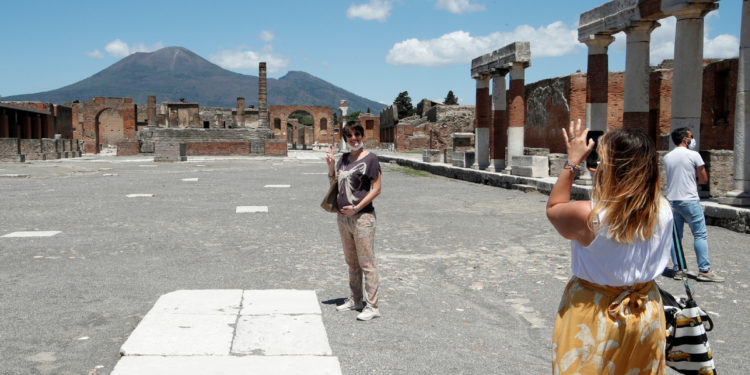Italy reopened to European travelers on Wednesday, three months after the country went into a coronavirus lockdown, with all hopes pinned on reviving its key tourism industry as the summer season begins.
Gondolas are ready to punt along Venice’s canals, lovers will be able to act out Romeo and Juliet on Verona’s famed balcony, and gladiator fans can pose for selfies at Rome’s Colosseum.
But there were fears that many foreign tourists would be put off from visiting a country still shaking off a vicious pandemic.
“Come to Calabria. There’s only one risk: That you’ll get fat,” Jole Santelli, the southern region’s governor, said on Sunday as the race began to lure big spenders-or any spenders-back to Italy’s sandy shores.
It imposed an economically-crippling lockdown in early March, and has since seen its contagion numbers drop off dramatically.
With the country facing its deepest recession since World War II, it needs foreigners to return, and quickly.
But it is still reporting dozens of new cases a day, particularly in the northern Lombardy region, and some experts warned that the government may have been hasty in permitting travel between regions and from abroad.
International flights were only expected to resume in three main cities: Milan, Rome and Naples.
Meanwhile, Switzerland has warned its citizens that if they went to Italy they would be subject to “health measures” on their return. The country will open its borders with Germany, France and Austria on June 15, but not with Italy.
Separately, Austria is lifting restrictions in mid-June for travel to Germany, Switzerland, the Czech Republic, Slovakia and Hungary-but again, not Italy, described last week by Austrian health minister as “still a hot spot”.
Other countries, such as Belgium and the United Kingdom, are still advising against, or forbidding, all nonessential travel abroad.
In response to perceived anti-Italian sentiment, Foreign Minister Luigi Di Maio has warned countries not to treat Italy “like a leper”.
Italy’s lockdown has had a particularly devastating effect on the tourism sector, which amounts to nearly 13 percent of the country’s GDP.
Parisians return to cafes
In neighboring France, Parisians returned to the City of Light’s beloved sidewalk cafes as lockdown restrictions eased on Tuesday.
The post-lockdown freedom along Paris’ cobbled streets will be tempered by social distancing rules for the city’s once-densely packed cafe tables. Paris City Hall has authorized outside seating areas only, with indoor seating off-limits until June 22. But the tiny tables will have to be spaced at least 1 meter apart, sharply cutting their numbers.
In Russia, a military official said sanitary and quarantine stations would be set up at airfields to hold barrier checkups for foreign delegations coming to participate in the upcoming Victory Parade.
According to Dmitry Trishkin, head of the Russian defense ministry’s main military medical directorate, all foreign participants and guests will be quarantined for two weeks.
Russia reported 8,536 new cases of the virus on Wednesday, taking its nationwide tally to 432,277, the third highest in the world.
The death toll hit 5,215 after the authorities said they had recorded another 178 deaths from the virus since the previous day.









